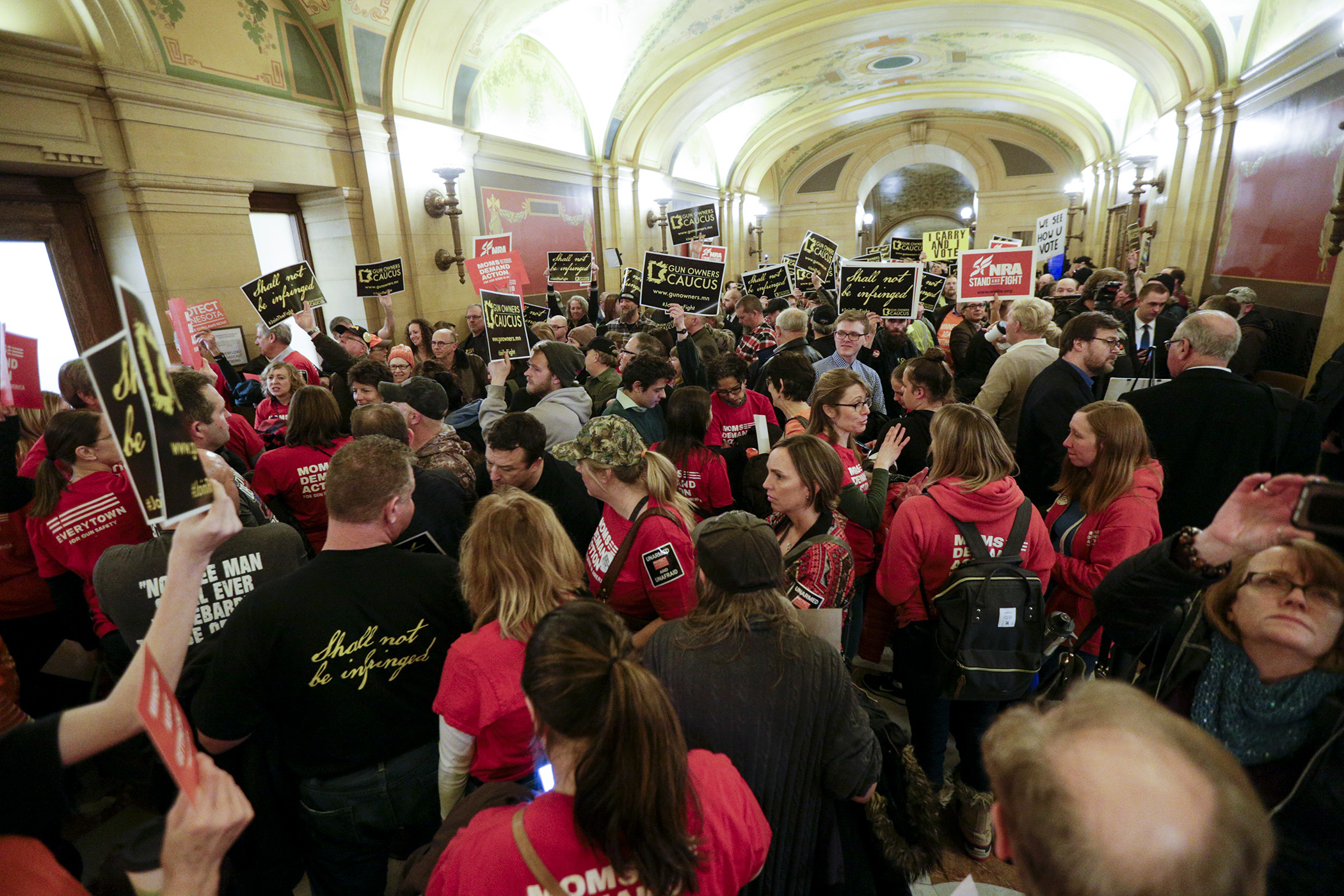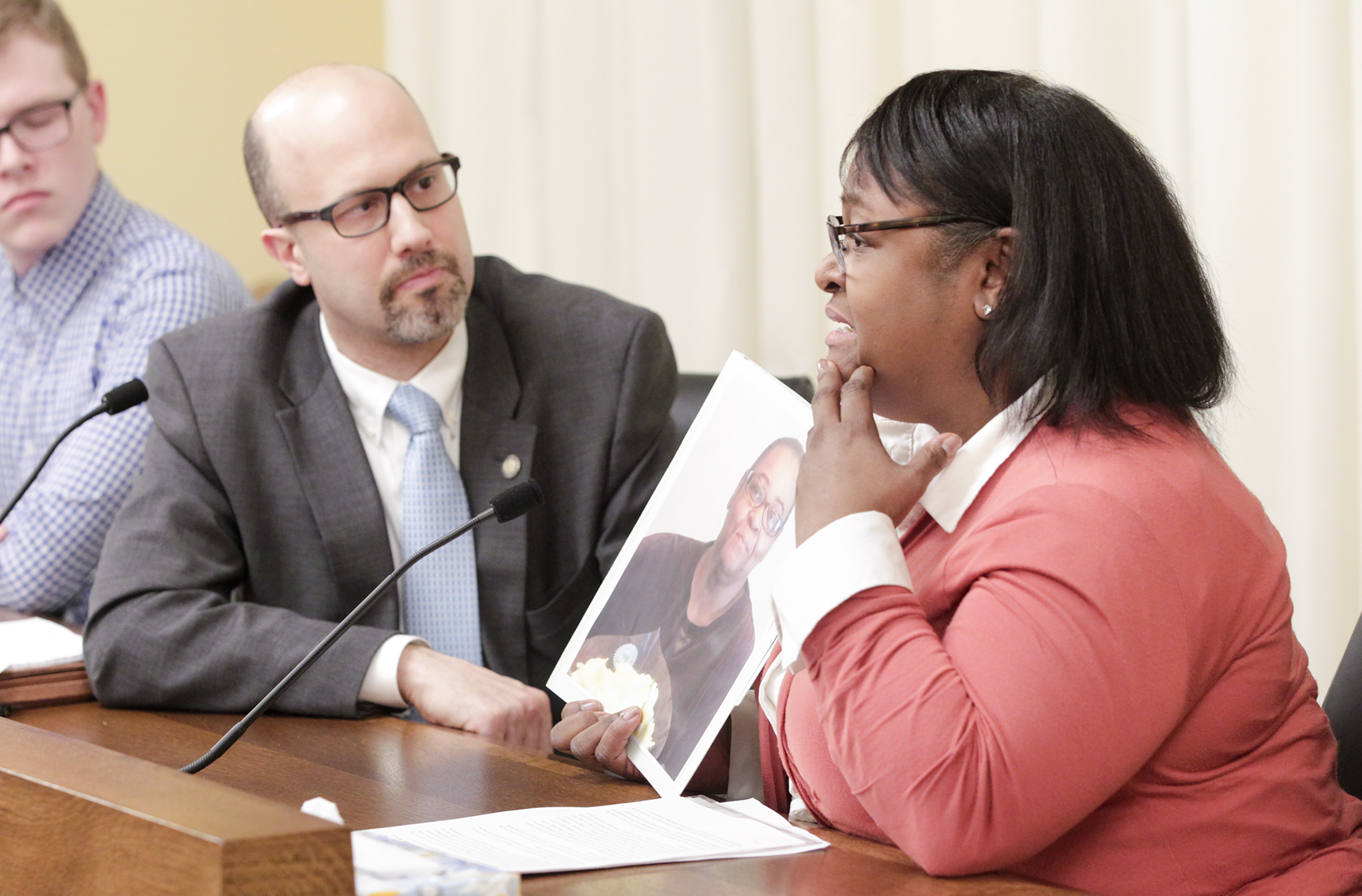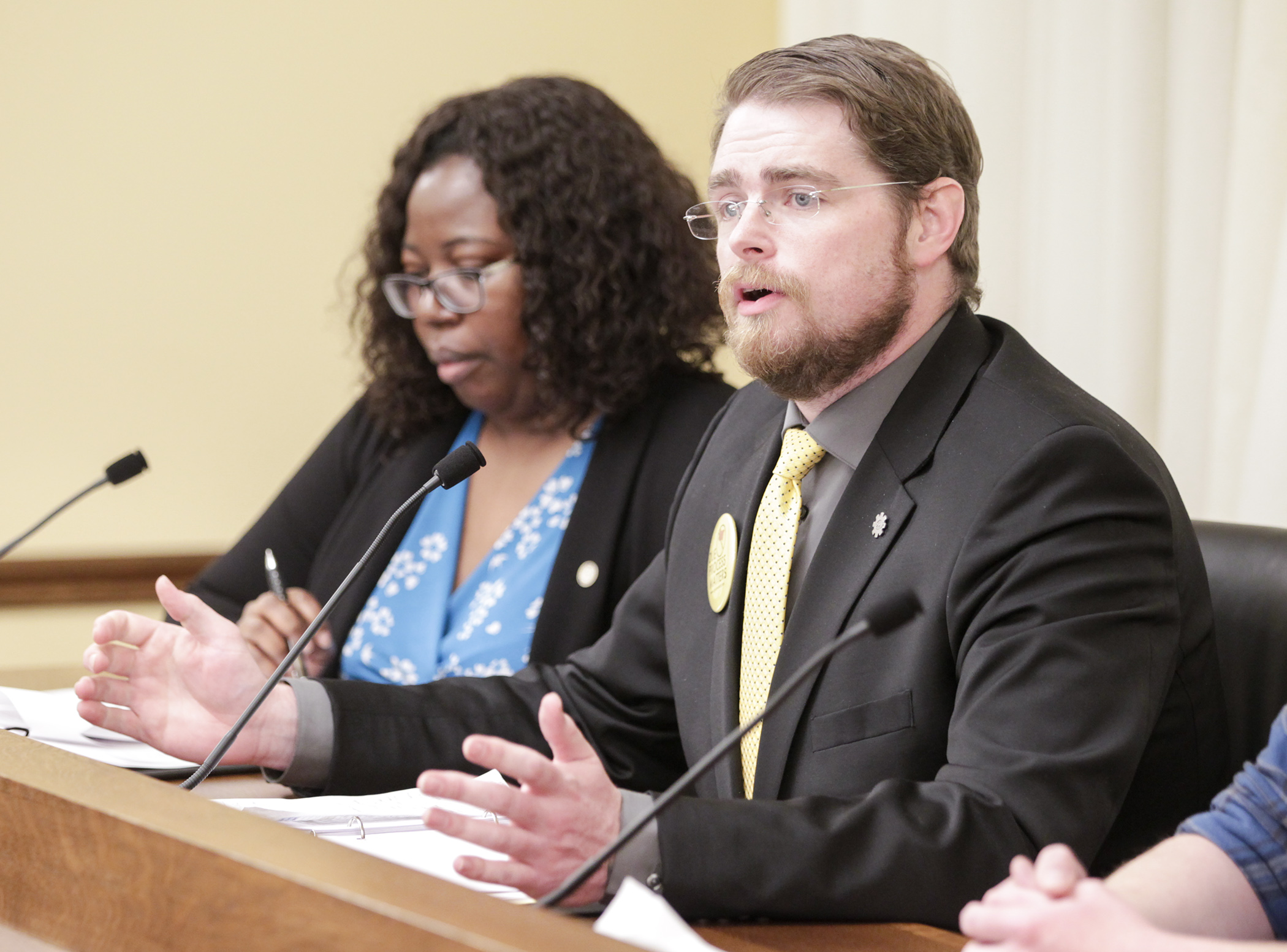Background check gun bill approved; risk protection order vote delayed

The air was tense; the emotions were raw; the voices were sometimes raised.
And the outcome was kind of predictable.
Late Wednesday, the House Public Safety and Criminal Justice Reform Finance and Policy Division approved one of two gun-control bills.
Sponsored by Rep. Dave Pinto (DFL-St. Paul) is HF8, the so-called “uniform criminal background check” bill. It would require the state to conduct background checks for most private firearm transfers, extend the requirement to complete a state background check to transfers of long guns and raise the age to receive a firearm in a private transfer from 18 to 21. Approved on a 9-7 party-line vote, the bill, as amended, next goes to the House Ways and Means Committee.
“Minnesotans deserve to be safe at school, at work and in the community, and this measure will help us with that,” Pinto said.
Just past midnight, and five hours after the hearing began, the division adjourned without taking a vote on the so-called “red flag” bill. Rep. Carlos Mariani (DFL-St. Paul), the division chair, announced that HF9, as amended, was tabled and is scheduled to be heard at the division’s meeting at 12:45 p.m. Thursday.
Sponsored by Rep. Ruth Richardson (DFL-Mendota Heights), the bill would create a procedure to petition for an “extreme risk protection order” that would remove firearms from people deemed at risk of harming themselves or others.
The bill specifies that family or household members, certain law enforcement officers, a city or county attorney, or a guardian can make such a petition.
Both sides of the aisle make their cases
DFL leaders said a majority of Minnesotans support the measures and they have proven effective in other states with similar laws to reduce gun violence.
“These are common-sense gun violence prevention measures and the time has come to make those bills the law in the state of Minnesota,” said House Majority Leader Ryan Winkler (DFL-Golden Valley) at a news conference earlier in the day.
Republicans say that they support reducing gun violence, but the measures would be ineffective.
“These are two bills that create restrictions on law-abiding citizens across the state of Minnesota, and will do very little to prevent our gun violence,” Rep. Brian Johnson (R-Cambridge) said at a morning news conference.
Background check differences
Universal background checks for individual gun sales will do nothing to deter criminals intent on committing crimes with guns they acquired illegally, said Rep. Jim Nash (R-Waconia), noting that the majority of gun crimes use such illicit guns.
“How are two people who are intent on committing a crime going to be impacted or slowed down at all by requiring them to have a background check?” he asked. “It just doesn’t make sense.”
 Sa’Lesha Beeks testifies in favor of HF8, sponsored by Rep. Dave Pinto, which would, in part, require most private firearm transfers be preceded by a firearms eligibility background check of the person receiving the firearm. Photo by Paul Battaglia
Sa’Lesha Beeks testifies in favor of HF8, sponsored by Rep. Dave Pinto, which would, in part, require most private firearm transfers be preceded by a firearms eligibility background check of the person receiving the firearm. Photo by Paul BattagliaDFL members disagreed, saying current required background checks on gun sales from licensed dealers are very effective, and the same could be expected if private guns sales were given the same scrutiny.
“The background checks currently happening through licensed dealers stop thousands of prohibited purchases every year,” Pinto said.
Members of the public weighed in, sometimes with emotional testimony.
Sa'Lesha Beeks, a member of the gun-control group Protect Minnesota, testified with a large photo of her deceased mother by her side. She described how she and her mother and daughter were shot at while the family was in a stopped car three summers ago.
The shooter was someone with a criminal record who could not legally own a firearm, she said, but who had purchased one illegally in a private sale not subject to a buyer’s criminal background check. As a result of the attack, her mother died and her daughter suffers PTSD from witnessing the trauma.
“Passing the HF8 bill could have saved my mother’s life and saved my daughter from a lifetime of trauma,” she said.
Bryan Strawser, chairman of the Minnesota Gun Owners Caucus, said the bill focuses on the wrong part of the problem because it puts a serious legal burden on law-abiding gun owners. “The problem here are individuals who operate in the illicit market, in transactions that are already illegal and transactions that should already be prosecuted for what they are,” he said.
There is no Senate companion for HF8.
Problematic possession
Rep. Marion O'Neill (R-Maple Lake) opposes an extreme risk protection order called for in HF9, in part, because current state law already accounts for such situations.
“HF9 violates the due process of citizens and potentially will do nothing to stop those who are intent on doing harm to themselves or others," she said. "If there is evidence someone is truly a danger to themselves or others, they need to be removed from the situation through a 72-hour psychiatric mental health hold, not just have their firearms confiscated."
Richardson countered that the state’s mental health system is very stressed due to shortages of psychiatrists and other health care personnel who can be called upon to invoke a 72-hour hold. “This red flag option gives another option to families and law enforcement,” she said.
“We have people calling all the way from Roseau trying to get beds here because of the lack of beds across the state,” Richardson said.
Shannon Johnson, a volunteer for the gun-control group Moms Demand Action, said she has lost two family members to gun violence: one who committed suicide and one who was murdered.
 Rob Doar testifies against HF9, sponsored by Rep. Ruth Richardson, left, which would in part provide a procedure under which an “extreme risk protection order” could prohibit someone from possessing firearms for a fixed period. Photo by Paul Battaglia
Rob Doar testifies against HF9, sponsored by Rep. Ruth Richardson, left, which would in part provide a procedure under which an “extreme risk protection order” could prohibit someone from possessing firearms for a fixed period. Photo by Paul BattagliaShe said the proposal would be an effective tool for law enforcement to keep families safe.
“When a person is in crisis, loved ones and law enforcement are often the first to see the signs that a person is a danger to himself or others,” she said, adding it would provide “a way for law enforcement to act before warning signs escalate to a tragedy.”
Using a 72-hour mental health hold on a person in crisis is a better way to ensure everyone’s safety because it focuses on getting medical help to the person in need, said Rob Doar, vice president and political director of the Minnesota Gun Owners Caucus. “If you go in and take the firearms, and then you leave the person in crisis, I would argue that you could be exacerbating the crisis by the person.”
A companion bill, SF436, sponsored by Sen. Ron Latz (DFL-St. Louis Park), awaits action by the Senate Judiciary and Public Safety Finance and Policy Committee.
In the Minnesota Senate
Both bills face stiff opposition from the Republican-controlled Senate, where Senate Majority Leader Paul Gazelka (R-Nisswa) has repeatedly spoken against gun-control proposals.
“The question is: 'Will Sen. Gazelka listen to Minnesotans?’” House Speaker Melissa Hortman (DFL-Brooklyn Park) said at the afternoon press conference.
Related Articles
Search Session Daily
Advanced Search OptionsPriority Dailies
Ways and Means Committee OKs proposed $512 million supplemental budget on party-line vote
By Mike Cook Meeting more needs or fiscal irresponsibility is one way to sum up the differences among the two parties on a supplemental spending package a year after a $72 billion state budg...
Meeting more needs or fiscal irresponsibility is one way to sum up the differences among the two parties on a supplemental spending package a year after a $72 billion state budg...
Minnesota’s projected budget surplus balloons to $3.7 billion, but fiscal pressure still looms
By Rob Hubbard Just as Minnesota has experienced a warmer winter than usual, so has the state’s budget outlook warmed over the past few months.
On Thursday, Minnesota Management and Budget...
Just as Minnesota has experienced a warmer winter than usual, so has the state’s budget outlook warmed over the past few months.
On Thursday, Minnesota Management and Budget...